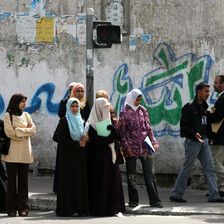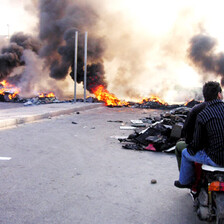Electronic Lebanon 12 May 2008
WASHINGTON, 12 May (IPS) - US Secretary of State Condoleezza Rice pledged her administration’s support for the Lebanese government Friday in the aftermath of Hizballah’s takeover of West Beirut, accusing the Iranian-backed group of “killing innocent civilians” in a bid to “protect their state-within-a-state.”
Three days of intense clashes between government and opposition supporters last week left at least 18 people dead and 38 wounded. As the guns fell silent over the city on Friday, so had the broadcasting signal of Future Movement Saad Hariri’s media operations. Hizballah seized television, radio, and print offices, tightened their grip on the airport, and remained in control of other areas, including the Bekaa Valley.
By Monday, fighting between pro-government Sunni Muslim gunmen and militiamen allied to Hizballah had spread to the northern city of Tripoli, bringing the overall toll to at least 81 dead and about 250 wounded.
The worst sectarian violence since the days of the country’s 15-year civil war has pushed Lebanon past the brink of its parliamentary impasse, and into a new phase of political crisis. Hizballah’s success has dealt a heavy blow to the ruling Sunni-led coalition and its primary supporter, the United States. In addition to “protecting their state-within-a-state”, the Shia political movement with a disciplined guerilla army sent the clear signal that it could challenge the very apparatus of the state, symbolically and discursively, but also — if need be — through violence.
“I think Hizballah showed [Friday] that it can control all of Beirut very quickly, that it could control other parts of Lebanon very quickly; it really displayed the military and tactical advantages,” said Lebanon expert Mohammad Bazzi, in a conference call with reporters Friday.
“Who will impose order on the streets of Beirut, or Lebanon? The answer today is basically no one is going to impose that kind of order, and that it is in the hands of Hizballah,” said Bazzi, a fellow at the Council on Foreign Relations, who is currently in Lebanon. “The whole day was a show of force.”
The outburst of violence was sparked by a government move Monday to shut down Hizballah’s telecommunications network, a move that Hizballah Secretary General Hassan Nasrallah decried as a “declaration of war” against the “resistance.”
Last weekend, Druze leader and prominent March 14th politician Walid Jumblatt held a press conference in which he accused the Shia group of spying on the Lebanese state, a charge based on the discovery of a secret camera on the airport runway to presumably record flights. Jumblatt also called for the dismantling of the private telecommunications network used by Hizballah’s military command structure, which Nasrallah said was instrumental to its success in the Israel-Hizballah war.
On Monday, Lebanese Prime Minister Fouad Siniora dismantled the telecom network and replaced the head of security. An airport labor strike that day became the vehicle for larger grievances, and soon, according to Bazzi, hundreds of Hizballah guerilla fighters moved through the streets of West Beirut and took over the Future Movement’s media operations.
Nasrallah, who has repeatedly vowed not to turn Hizballah’s arms against Lebanese citizens, tried to explain the show of force as a defensive maneuver, but according to Bazzi, many Lebanese did not look at it that way.
“[Hizballah] did in their statements seem to go to great lengths to keep the damage and casualties very low. These were some intense street battles that went on for hours and hours,” said Bazzi. “It’s difficult to tell who’s winning the information war, because one side lost a good deal of its media today.”
On Monday, US Secretary of State Condoleezza Rice was praising Arab regimes for rejecting militia attacks inside Lebanon, but she called the advancement of democracy in the region “very fragile.” Washington’s support of the Lebanese government has become the centerpiece of its democratization strategy in the Middle East. For many critics of the US approach, Washington’s embrace of the March 14th coalition, which includes divisive political figures such as Walid Jumblatt and Lebanese Forces leader Samir Geagea, reflects a policy of creating divisions, not unity and legitimacy.
In the Middle East, a region that continues to be penetrated by the imposition of a national-state system, territorial boundaries and the legitimacy of the governing elite remain contentious. Armed militias continue to be an obstacle towards reconciliation, and at the same time, a vehicle for the continuation of a US policy more broadly aimed at stemming the influence of Iran.
In a report that appeared on the Washington Note blog Friday, journalist Nir Rosen described the origins of the militias that fighting Hizballah throughout Lebanon.
“The Americans along with their Saudi allies backed the creation of sectarian Sunni militias in Lebanon, some of whom were even trained in Jordan. Their ideology consisted of anti Shia sectarianism,” wrote Rosen. “But these Sunni militiamen proved a complete failure, and America’s proxies in Lebanon barely put up a fight, despite their strident anti-Shia rhetoric. Now it is clear that Beirut is firmly in the hands of Hizballah and nothing the Americans can do will dislodge or weaken this popular movement.”
But most analysts believe that the recent violence was not an intended outcome of the US policy; it has only exposed the March 14th coalition’s political weakness, and placed more pressure on an already overstretched Lebanese Army, an institution prized for its impartiality, and whose cross-sectarian ranks presumably embody the unity of the Lebanese state.
“There is one interpretation out on the streets of Beirut these days that the government wanted to provoke some sort of confrontation over Hizballah’s arms as long as the Bush administration is still in power,” said Bazzi.
“Hizballah and Nasrallah would definitely have you believe this entire maneuver was cooked up by the US, but there really doesn’t seem to be much evidence of that … it seems to have caught diplomats here by surprise, and they weren’t ready for it,” he said.
Syria and Lebanon expert Josh Landis also dismissed the idea that the US promoted this type of confrontation: “There will be those who believe this is part of a larger US and Israeli plan to sucker Hizballah into overreaching only to provide justification for a second Israeli attack,” he wrote on his widely read blog, SyriaComment. “I am inclined to believe that March 14th was dragged along by rash leadership. It is hard to believe Washington would be so foolish.”
All rights reserved, IPS - Inter Press Service (2008). Total or partial publication, retransmission or sale forbidden.





